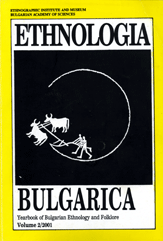Статусни роли, власт и ценности в семейството
Status Roles, Authority and Values in the Family
Author(s): Milena Benovska-SabkovaSubject(s): Anthropology
Published by: Институт за етнология и фолклористика с Етнографски музей при БАН
Summary/Abstract: It is the purpose of this article to follow the processes and changes taking place in the value system of the Bulgarian family and kin under the influence of the political and social transformations in the wake of 1989. Quoting comparative data is a possible corrective, warding off precipitous conclusions. The article has been written on the basis of materials from Northwestern Bulgaria, Eastern Serbia and the Island of Crete in Greece. The status roles and value systems of the Bulgarian family have been subjected to tangible changes since the 1930s. Of crucial importance in this respect has been the demographic transition from a family with many children to a family with two children, entailing changes in the rights and status of women. In the time between the two world wars, the “traditional” model of property inheritance, depriving women of property rights on real estate, wavered and lost its imperative character. That process accelerated under socialism and in the post-socialist period. Under socialism there was crucial modernisation regarding the female status and the democratisation of family relations. At the same time, however, the status roles were characterised by “transience”. This continued to be in force during “the transition” (the 1990s), when the processes, typical of the socialist age, continued to develop. What has been observed has been “a turnaround of the value pyramid of the family”. The power domination of the elder generations in the family group and in the family, characteristic of the premodern times, has been replaced by a value system, in which the conception about children as supreme value has been uppermost. Children have become a top priority and focal point of the efforts not only of the nuclear family, but also of the entire family and kinship group. Associated with this has been “the reverse side of the medal” and the dependence of “the children” of mature age. The uppermost place occupied by children in the value system of the family is a feature, characteristic not only of Bulgaria, but of Serbia and Greece, as well. Whereas differences can be found in the Bulgarian, Serbian and Greek environment with regard to the property rights of women and their status, no significan differences can be found regarding the place and status of the children. In the postsocialist period in Bulgaria, the problems investigated in the sphere of family and kin continue to be dominated by the orientation of the processes that had taken shape in the past socialist period.
Journal: Българска етнология
- Issue Year: 2001
- Issue No: 2
- Page Range: 7-25
- Page Count: 19
- Language: Bulgarian

